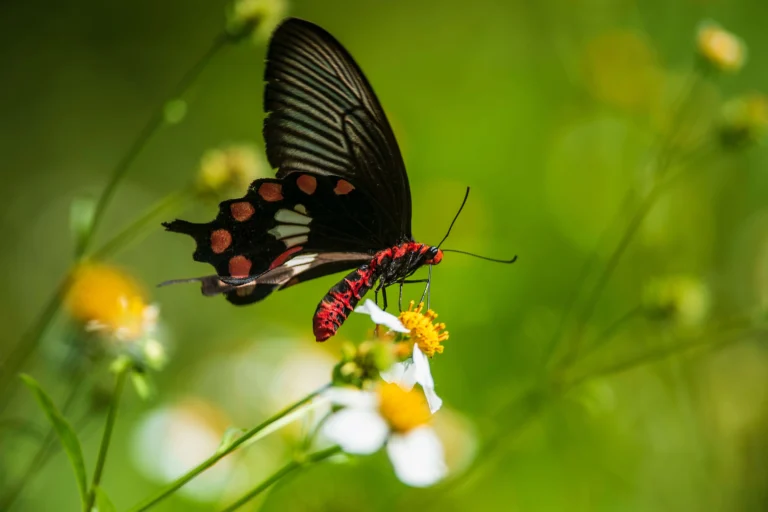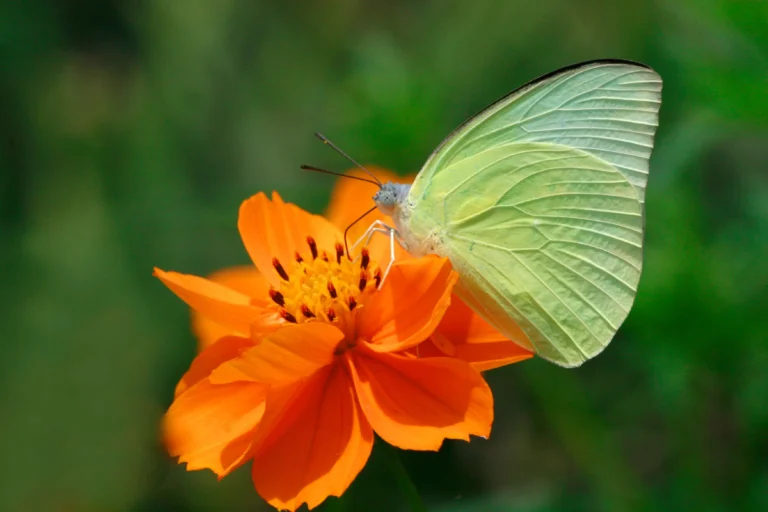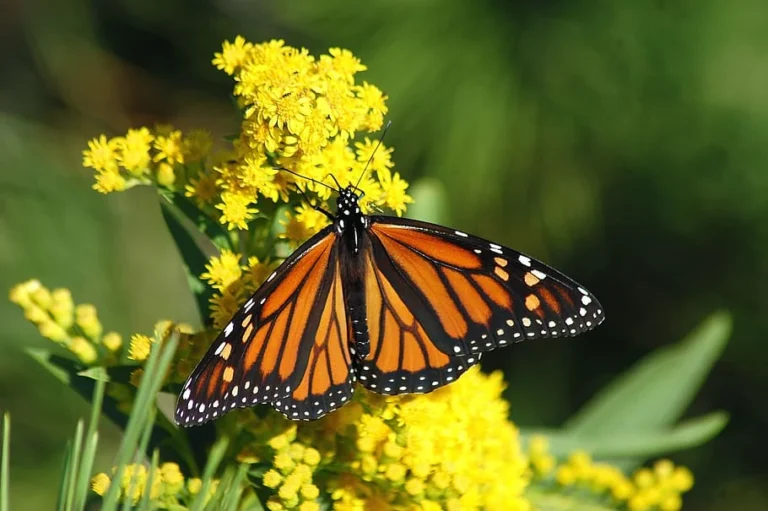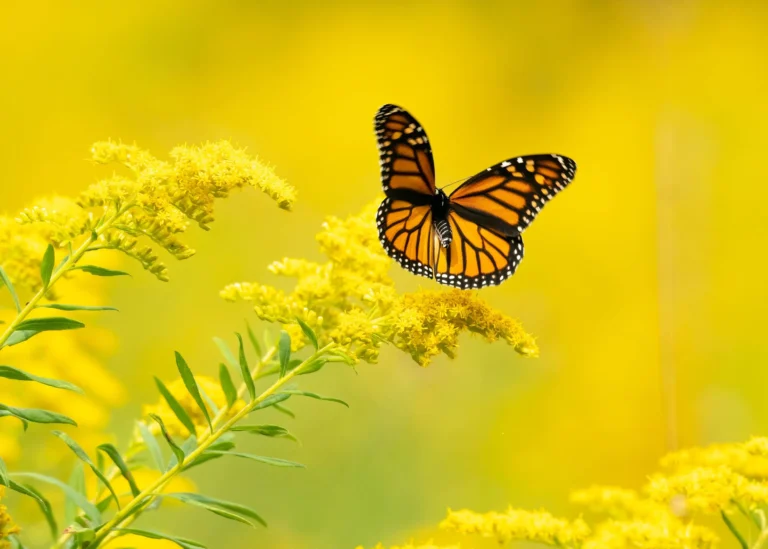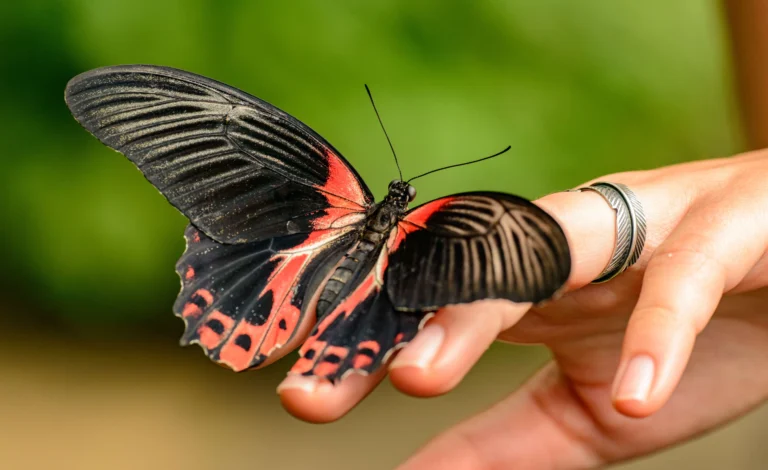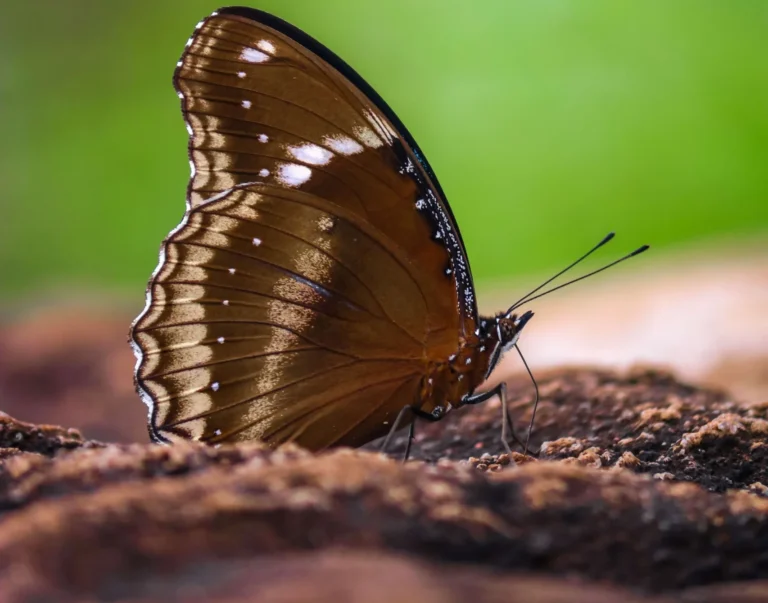You Give Me Butterflies Meaning: Origins, Context & Emotions
“You Give Me Butterflies” refers to a feeling of excitement mixed with nervousness. It’s like having real butterflies flutter in your stomach. People use it to describe emotions from joy to slight unease, often felt around someone special or before a big event. Different cultures understand the feeling, even if they use other words. The feeling is backed by a biological reaction where our body releases adrenaline, changing blood flow and causing the ‘butterfly’ sensation in our stomach.
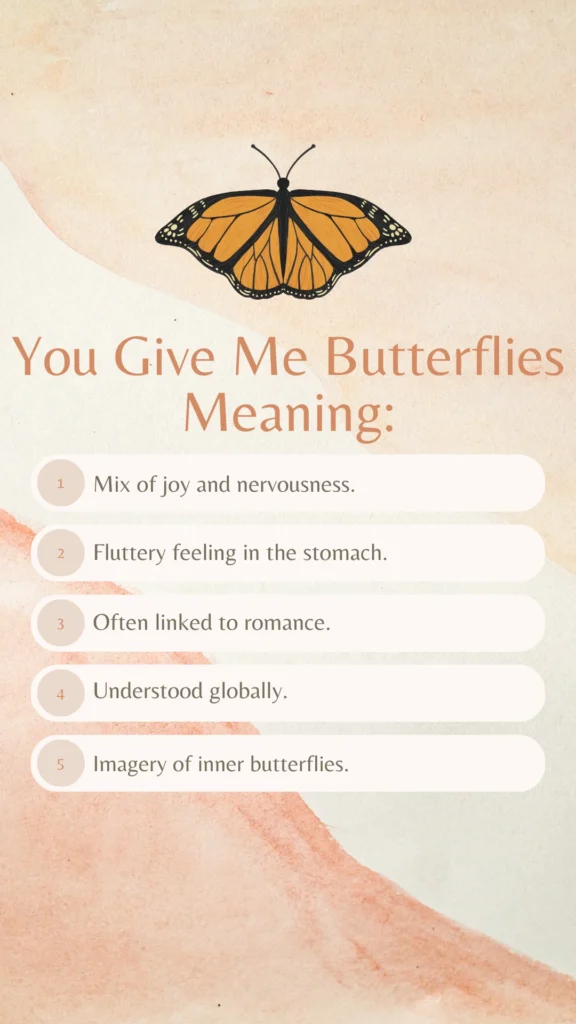
Table of Contents
Introduction
Have you ever heard someone say, “You give me butterflies”? Perhaps you’ve experienced it—a fluttery sensation in your stomach when talking to someone special or before a significant event. This feeling is universally shared.
From big cities to calm villages, people everywhere have felt these butterflies. In this article, we’ll explore what this phrase means, where it comes from, and how people from different places understand it.
Ready to discover the mystery of the butterflies in your stomach? Let’s start.
You Give Me Butterflies Meaning
“You Give Me Butterflies” is a saying that talks about many feelings. Think about real butterflies moving in your stomach. It feels funny and ticklish. When someone says this, they mean they’re happy and a little nervous at the same time. Just like the myriad of interpretations surrounding the white moth’s meaning and symbolism.

In Different Situations:
- He gives me butterflies – This often means someone feels excited because they like someone. It could be about a first date or recalling a special time.
- Your voice gives me butterflies – Sometimes, a voice can bring out strong feelings. A certain tone or memory linked to a voice can cause that fluttery feeling.
- This song gives me butterflies – Music can take us back to old times and feelings. When a song does this, it’s like it’s speaking directly to our hearts.
Cultural Meanings
- In Hindi – In India, the direct translation is “मेरे पेट में तितलियाँ उड़ रही हैं,” which means “Butterflies are flying in my stomach.” It’s not a usual saying, but the feeling behind it is known to all.
- In Urdu – Urdu has poetic ways to express feelings. While there might not be a direct phrase for “you give me butterflies,” sayings like “میرے دل کو چھو لیا,” which means “You’ve touched my heart,” share the same emotion.
In different cultures, butterflies often symbolize transformation, hope, and the essence of life. For many, the allure of butterflies extends to body art, with butterfly tattoos holding profound meanings.

Historical Context and Literary Uses
Throughout history, different cultures and civilizations have used phrases and idioms to describe the rush of emotions similar to “butterflies in the stomach.” Let’s have a look into the journey of how this sentiment has been expressed historically:
Antiquity and Ancient Literature
Many ancient cultures used different ways to talk about feelings in the stomach area to show strong emotions. Although they might not have said “butterflies in the stomach,” they had their own ways of talking about excitement or worry.
For example, old poets from places like Greece and Rome sometimes talked about a racing heart or a turning stomach.
Middle Ages to Renaissance
In more recent times, authors started to use more modern ways to talk about feelings. Writers like Jane Austen and F. Scott Fitzgerald told stories about people feeling nervous or excited.
When you read their books, you can see characters feeling something like “butterflies” in their stomach.
19th and 20th Century Literature
As literature modernized, so did the portrayal of human emotions. Notable authors such as Jane Austen, F. Scott Fitzgerald, and Virginia Woolf crafted stories that encapsulated the fluttering sensations akin to “butterflies.”
Be it Elizabeth Bennet’s anticipation in “Pride and Prejudice” or Jay Gatsby’s profound longing in “The Great Gatsby,” the feeling was evident.
Biological Explanation

Ever wondered why we feel “butterflies” in our stomach when nervous or excited? Here’s the science behind it:
When we’re feeling a strong emotion, our body releases a chemical called adrenaline. This makes our heart beat faster and our muscles get ready to respond. But our stomach? It feels a fluttering sensation.
Here’s why: our body sends more blood to important muscles and takes it away from areas like our stomach. This change can make our stomach feel funny, just like the “butterflies” people talk about.
This isn’t only when we’re nervous. We can feel it when something moves us emotionally, like a touching movie scene or a special song.
Personal and Anecdotal Experiences
People all over the world have shared moments when they felt “butterflies.” Here are some of their stories:
- First Day at School – Mina from Seoul was both excited and nervous on her first day at a new school.
- Surprise Proposal – Sam from Toronto felt a rush when he got a surprise proposal at sunset.
- Job Interview – Riya from Mumbai felt mixed emotions waiting for her big job interview.
- Childhood Song – Carlos from Mexico City felt a deep connection hearing an old song his mom used to sing.
All these stories show that the “butterfly” feeling is something many people experience in different ways.
The Universal Nature of the Expression

What’s interesting about “You Give Me Butterflies” is how many people around the world understand it. It doesn’t matter where you are; the feeling is the same. It’s about our shared human emotions. Everyone feels excited, nervous, or moved at times, no matter where they’re from.
Various Triggers, Same Response
Different triggers may bring about the sensation of “butterflies” in various people. While a first date might excite one individual, another might feel it before stepping onto a stage or recalling a dear memory. Despite the diverse reasons, the sensation is often consistent.
This shared experience, despite our varied triggers, underscores the universal nature of emotions. It’s a testament to our shared humanity. Throughout the ages, artists, writers, and musicians have attempted to encapsulate this mutual feeling.
The true allure isn’t just in the emotion itself, but in the realization that somewhere out there, someone else is undergoing the same. It’s a beautiful affirmation of our collective human experience.
Tips on Handling the “Butterflies” Feeling
Feeling “butterflies” in your stomach can be a beautiful sensation, signaling the start of something new and exciting. But sometimes, it might become overwhelming, especially if it stems from anxiety or nervousness. Here are some practical tips to handle that fluttery feeling:
- Deep Breathing: Breathing slowly can calm you.
- Grounding Techniques: Use methods like the “5-4-3-2-1” method to feel more present.
- Positive Thinking: Think of good outcomes.
- Stay Ready: If you’re nervous about an event, prepare well for it.
- Accept the Feeling: Understand that it’s a normal feeling.
- Distraction: Do something else to stop thinking about it.
With time and these tips, you can handle the “butterflies” feeling.
Remember, it’s natural to feel nervous or excited at times, and “butterflies” are just a manifestation of those emotions. With practice and the right techniques, they can be managed effectively.
Conclusion
The phrase “you give me butterflies” is more than just words; it encapsulates a myriad of emotions, sensations, and shared human experiences. From the fluttery feelings that arise with new love to the nervousness preceding a big event, the sensation is something almost everyone can relate to.
But, if you’re interested in diving even deeper into the world of butterflies, understanding the monarch butterfly’s meaning and symbolism can further enrich your perspective.
Throughout our discussion, we’ve dived deep into its meanings, context, and the myriad situations that can bring about these “butterflies.” From its cultural significance across languages to its biological explanation, we’ve seen how this simple expression holds so much depth.
What’s truly beautiful is how universal this feeling is. No matter where we are from, what language we speak, or our personal life stories, this fluttery feeling in our stomach connects us all. It’s a testament to our shared humanity, a gentle reminder of the emotions that make our life experiences rich and varied.
So, the next time you feel those “butterflies,” take a moment to reflect. Embrace the feeling, understand its origins, and remember that you’re part of a vast tapestry of human experiences, each one unique yet strikingly similar.



